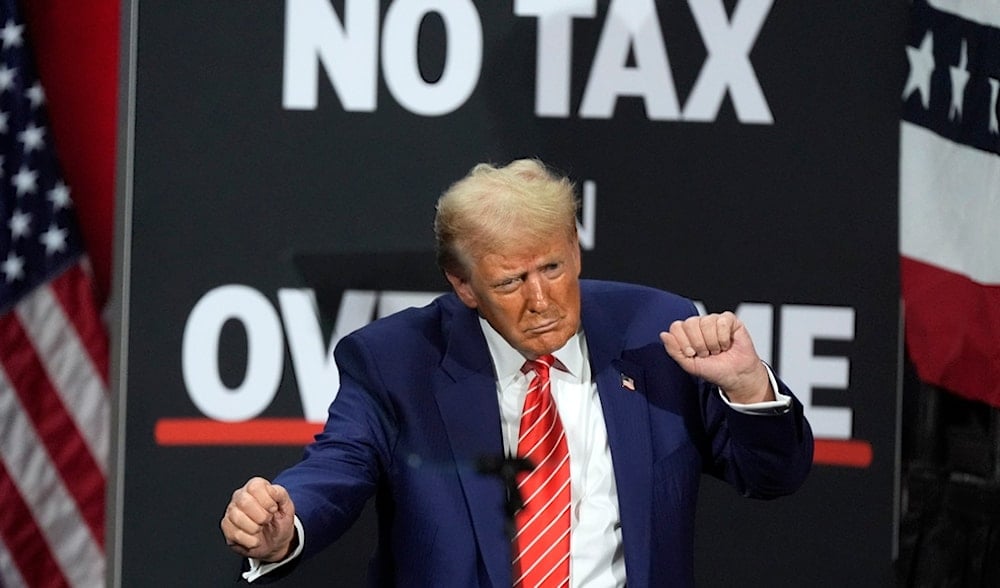Trump foreign gifts raise alarms over ethics, influence amid Gulf ties
A new congressional report reveals that Donald Trump accepted a private jet and expensive gifts from Gulf states, raising serious ethical concerns over foreign influence and transparency.
-

Then-Republican presidential nominee former President Donald Trump dances at a campaign event at the Cobb Energy Performing Arts Centre, Oct. 15, 2024, in Atlanta (AP)
Former White House lawyers and foreign affairs experts have described US President Donald Trump's acceptance of foreign gifts and investments as "unprecedented", pointing to a pattern of behavior that marks a fundamental shift in how US foreign policy is conducted, now operating under what many describe as a pay-for-access approach, The Guardian reported.
This week, during a high-profile trip to the Gulf states, Trump was celebrated with fanfare while negotiating what he claimed were multi-trillion-dollar deals. He presented this foreign policy approach as part of his "America First" doctrine, downplaying concerns over human rights or international law in favor of financial gains for American businesses and taxpayers. However, reports indicate these benefits often extend to Trump himself.
Trump's personal fortune has reportedly grown by over $3 billion, with additional gains tied to cryptocurrency and international investments, including proposals for Trump-branded properties. Business allies with close ties to Trump have also secured lucrative contracts abroad, aligning their political support with financial returns.
Concerns over national integrity and influence
Richard Painter, former chief White House ethics lawyer under George W. Bush, expressed alarm, saying, "The concern is that our negotiating position will change if someone does a favor or delivers a gift to the president... the impression is given that the position of the United States can be swayed and even bought."
Norm Eisen, former Obama administration ethics czar, echoed those concerns, emphasizing that "Trump has put a for-sale sign out front of the White House... Of course, you’re going to see Qatar and UAE as, like, a bidding war."
Controversy over $400M jet offer from Qatar
Among the most contentious gifts was Qatar's offer of a $400 million Boeing 747-8, which Trump suggested could serve as Air Force One and later be transferred to his presidential library.
Critics argue that such a gesture may violate the Constitution’s emoluments clause, though some legal experts remain uncertain.
Trump called the jet a "great gesture" and questioned why he shouldn’t accept it. Democratic lawmakers, on the other hand, condemned the aircraft as a "flying palace," citing national security risks and ethical concerns.
UAE-linked crypto investment raises red flags
Meanwhile, the United Arab Emirates has also reportedly funneled $2 billion into a Trump-affiliated stablecoin project. A memo sent to congressional Democrats described the venture as a "massive crypto scam on the American people."
Watchdog groups are raising questions over the legality and transparency of such deals. Scott Amey of the Project On Government Oversight commented, "Never seen it before... Is it allowed? I’m still uncertain."
Departure from past ethical norms
Past administrations routinely rejected even symbolic gifts. Painter noted that even a signed baseball bat from the Boston Red Sox required reimbursement. During the Obama administration, Eisen reportedly blocked the president from refinancing his mortgage to avoid any perception of undue influence.
Rufus Gifford, former State Department protocol chief, emphasized the seriousness of the ethical breaches, stating, "It is very, very disturbing that a president of the United States could be in a position to profit off the office... that is never supposed to be able to happen."
Foreign policy realignment, financial entanglements
Trump’s realignment of Middle East policy, skipping "Israel" and focusing on Gulf nations, has led to a flurry of transactions and personal business involvement. Advisors such as Steve Witkoff and members of the Trump family with interests in the region have reportedly played pivotal roles.
According to Dr. F. Gregory Gause III of the Middle East Institute, "The notion that Trump family private business and US government business walk hand in hand is remarkable."
While visible assets like jets draw public scrutiny, experts warn that billions in cryptocurrency can move secretly, potentially facilitating foreign influence. A China-linked firm with no reported revenue allegedly invested $300 million into a Trump-themed cryptocurrency, raising new alarms.
Legislative response underway
Senate Democrats are seeking to revise the Genius Act, aiming to close loopholes that would allow Trump to profit from stablecoins and other digital assets.
"It must include safeguards that make it harder for criminals, terrorists, and foreign adversaries to exploit the financial system," a congressional memo warned.
With mounting evidence of foreign influence and personal enrichment, former officials are demanding renewed commitment to transparency and ethical governance.

 4 Min Read
4 Min Read










